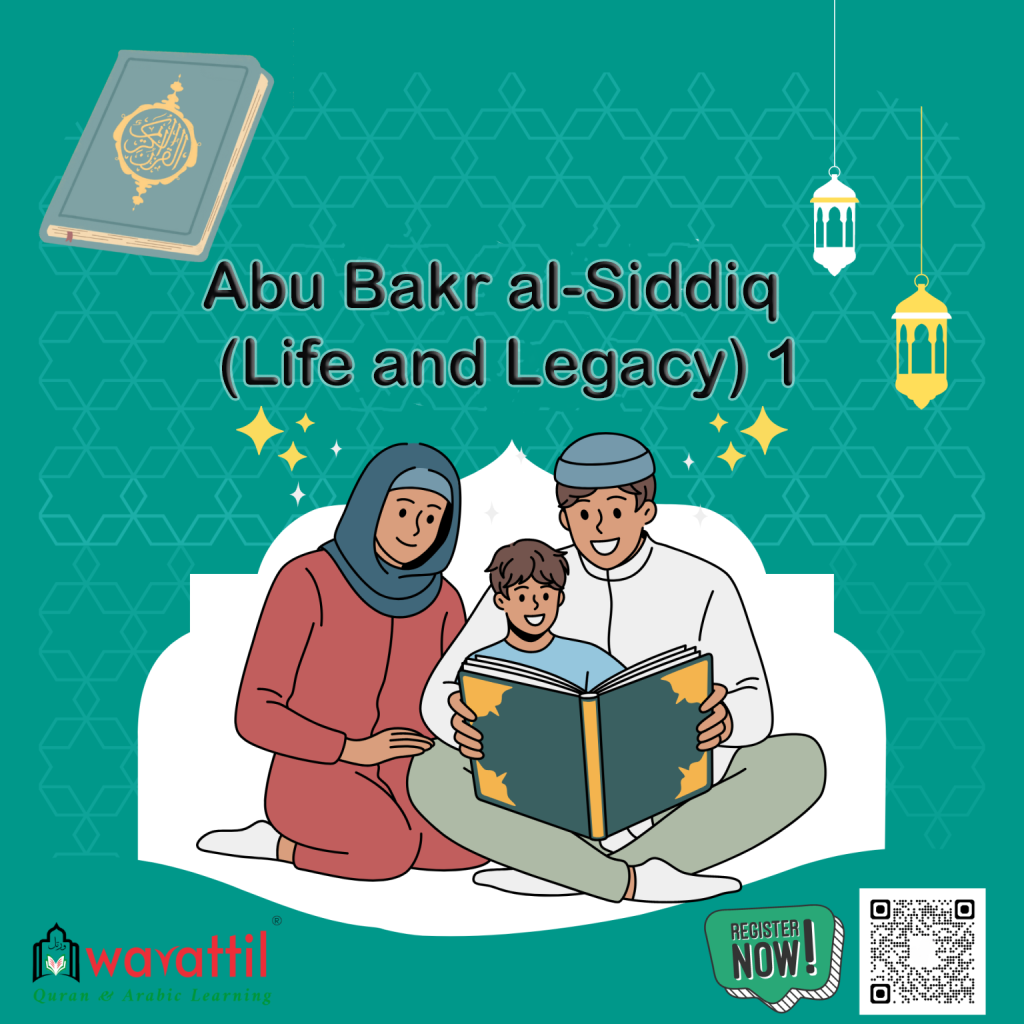
Introduction
Sides of his greatness
Abu Bakr al-Siddiq in Mecca
((about his names and nicknames and their meanings)
Abu Bakr al-Siddiq is the first caliph in Islamic history, and his life and legacy inspire Muslims worldwide.
I was in love with his famous biography, and I hope that I will write about him when I was a child. He was great in his belief, great in his knowledge, great in his ideas, great in his behavior, and great in his manners. Every Muslim listens to him or reads his Sirah. He falls in love.
He was qualified to be a close friend of the prophet Muhammad—may Allah’s peace be upon him—and the prophet reported about him.
“Abu Bakr al-Siddiq is my friend and companion.”

Abu Bakr al-Siddiq is the best after messengers and prophets. Some scholars say that the difference between the prophet and his companion Abu Bakr is the message and prophecy from Allah.
When Muhammad ibn al-Hanafiyah asked his father Ali ibn Abi Talib—may Allah be pleased with him—”Who is the best of people after the prophet—may Allah peace be upon him?
He answered: Abu Bakr al-Siddiq
There was a great relationship between both before Islam that the prophet and Abu Bakr al-Siddiq were from the tribe of Quraysh in Mecca, and both had the same manners as they were honest, generous, faithful, and truthful. Friendship increased and became stronger after Islam. Abu Bakr al-Siddiq converted to Islam early without any doubt when the prophet called him, and he was the first believer among free men.
Abu Bakr al-Siddiq was born in Mecca in 573 CE. He is from Banu Taym from Quraish.
Abu Bakr al-Siddiq—may Allah be pleased with him—”accompanied the prophet Muhammad all the time and everywhere, even in the cave migration from Mecca to Al-Madinah, a journey fraught with danger as in surat At-Tawbah.
Abu Bakr al-Siddiq witnessed all battles with the prophet Muhammad—peace be upon him—like Badr, Uhud, and the battle of the Trench; his steadfastness during challenging times, like in Hudaybiyyah and the farewell pilgrimage, demonstrated his deep commitment to Islam.
The prophet married his daughter Aisha.
It is Islamic brotherhood and friendliness, and if I were to take a Khalil other than my lord, I would have taken Abu Bakr, and Allah revealed a lot of Quranic verses regarding Abu Bakr al-Siddiq.
Abu Bakr as-Siddik was the minister and helper of the prophet Muhammad—peace be upon him. He embraced Islam and called to Allah to help the prophet Muhammad in his Dawah and to lead mankind out of disbelief into belief in the oneness (Tawheed) of Allah and to save them from the depths of darkness (polytheism) into light (monotheism) in Islam and invites them to the home of peace and guides them to straight path and Masha Allah, he led the companions in prayer during the prophet’s illness.
Allah said in surat al-Lail
“وسيجنبها الأتقي الذي يؤتي ماله يتزكي وما لأحد عنده من نعمة تجزي إلا ابتغاء وجه ربه الأعلى، ولسوف يرضي.”
“And those with Taqwa will avoid hell, who gives of his wealth to purify himself, and who has no favor from anyone to be paid back, but only the desire to seek the face of his lord most high, and soon he surely will be pleased when he will enter paradise.
The prophet Muhammad reported:
“The best generous to me in regarding his companionship and wealth is Abu Bakr, all the gates of the mosque except the gate of Abu Bakr—may Allah be pleased with him.”
His early support was important in the spread of Islam. He used his wealth to free the oppressed Muslims.
Abu Huraira reported that the prophet Muhammad said, “Who became fasting among you today?
Abu Bakr al-Siddiq replied, I did.
The Prophet again said: Who among you followed the funeral procession today?
Abu Bakr replied, I did.
The Prophet again said: Who among you fed a poor person today?
Abu Bakr al-Siddiq replied, I did.
The Prophet again said: Who among you visited an ill person?
Abu Bakr al-Siddiq said, I did.
The messenger of Allah said, “Anyone who combines these good deeds will surely enter paradise.”
It is wonderful when you know that the best group of the companions of the prophet Muhammad—peace be upon him—they would enter paradise. They embraced Islam via Abu Bakr, who invited and called them to Allah and his prophet, and they are Uthman ibn Affan, Abdur Rahman ibn Awf, Az-Zubayr ibn al-Awwam, Talha ibn Ubaydullah, Abu Ubaydah ibn al-Jarrah, Sad ibn Abi Waqqas, and Bilal ibn Rabah—may Allah be pleased with them”.
Umar ibn al-Khattab said, “Abu Bakr is our gentleman, and he liberated our chief means, Bilal.” And he said, “Abu Bakr is our leader, our blessing, our best, and the prophet loves him more.”
“والسابقون الأولون من المهاجرين والأنصار والذين اتبعوهم بإحسان رضي الله عنهم ورضوا عنه وأعد لهم جنات تجري من تحتها الأنهار خالدين فيها أبدا ذلك الفوز العظيم.”
And the first to embrace Islam of muhajireen (people who migrated from Mecca to al-Madinah) and Ansar (the citizens of al-Madinah) and those who followed them in all good deeds. Allah is pleased with them, and they are pleased with Him, and He has prepared for them gardens through which rivers flow, to dwell therein forever. That is the supreme success.
Abu Bakr al-Siddiq in Mecca: We will talk firstly about his names and nicknames and their meaning.
He is Abdullah bin Uthman bin Amer bin Amr bin Kab bin Sad bin Taim bin Murrah bin Luaie bin Ghalib al-Qureshi and meets with the prophet in parentage in the sixth grandpa, Murrah, and is called Abu Bakr (his kunya), and it means he is the owner of a great tribe, and he has a lot of nicknames referring to being an honor, a high position, appreciated, and respected.
1. The first nickname is العتيق al-Ateeq, and it means free, great, generous, and beautiful.
The prophet Muhammad—may Allah peace be upon him—reported: ” (Abu Bakr) are free from the fire.”
2. The second nickname is الصديق al-Siddik, and it means truthful, that he believes in the prophet’s sayings and many positive answers to him.
Anas narrated that the prophet Muhammad—may Allah’s peace be upon him—Abu Bakr, Umar, and Uthman climbed Mount Uhud, and it shook them, so the prophet said, “Be fixed, Uhud! There is only above you the prophet, al-Sidik, and 2 martyrs, so Abu Bakr is al-Siddik; also, he embraced Islam without any doubt and much belief, mashaAllah.
Abu Bakr al-Siddiq—may Allah be pleased with him—is the best companion and highly truthful.
3- Third Nickname: الصاحب (al-Sahib), which means the friend, and Allah called Abu Bakr al-Sahib in the cave during migration and it is special for Abu Bakr only, although many great sahabah (companions) migrated, and the Quran recorded that.
Allah said in the holy Quran: “When the prophet and his friend Abu Bakr were in the cave, the prophet said to Abu Bakr, “Do not be sad; Allah is with us.”
4. The fourth nickname is الأتقي (al-Atqa); it means who is more fearful of Allah, and it means piety,” and Allah called Abu Bakr al-Atqa.
Allah said in surat al-Lail, “And those with Taqwa will avoid hell, who gives of his wealth to purify himself.”
5- The fifth nickname is الأواه (al-Awah), and it means more fear from Allah, more dua, and be humble, and Imam Ibrahim al-Nakhee called him al-Awah.
He said: Abu Bakr is called al-Awah because of his grace and mercy).
Abu Bakr al-Siddiq—may Allah be pleased with him- is the best companion and highly truthful.
Legacy and Influence
Abu Bakr’s tenure as Caliph, though brief, left an indelible mark on Islamic governance and spirituality. His humility was evident in his famous inaugural speech, where he stated:
“I have been appointed over you, but I am not the best among you. If I do well, help me; and if I act wrongly, correct me.”
Abu Bakr passed away in 634 CE after two years of leadership and was buried beside the Prophet in Medina. His legacy is characterized by his devotion to Islam, justice, and service to the community.
Abu Bakr al-Siddiq’s life embodies the highest ideals of Islamic character and leadership. His contributions to Islam, both during the Prophet’s lifetime and as the first Caliph, laid the foundation for the growth and consolidation of the Muslim ummah. His legacy continues to guide and inspire those seeking to lead with integrity and serve their communities with devotion.
Have questions or want to register now? Contact us directly here: Contact Us 📱 Phone: +20 109 640 3180 🕒 Available 24/7 to assist you

My son feels happy, amazing teachers and staff in wrattil and flexible prices MashaAllah Thank you so much

My daughter started learning in warattil academy and alhamdulilah we are really impressed and have enjoyed learning with wrattil. May Allah reward her sheikh

My teacher Ahmed is very good. He helped me recite and memorize holy Quran

Warattil is the most efficient way of learning Arabic. I like warattil curriculum and excellent teachers to support this learning Thank you so much

I highly recommend warattil Ijazah programs to anyone who wants to learn Quran properly.

Very well organized MashaAllah. I love it and this is a great course if you want to understand the Quran and learn tafsir

Warattil program is the best I have seen. The teacher is really great and is available to answer questions in a clear manner

I think warattil is the best academy in learning Arabic and I recommend Arabic course to anyone

We are so happy with ustad Hussein. He is very patient and comfortable teacher. May Allah the teachers and admin in warattil

Rating 10 mashaAllah and so grateful